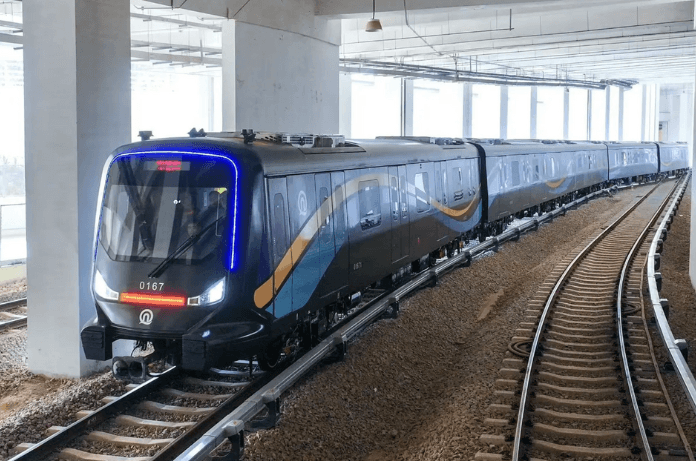The Cetrovo 1.0 Carbon Star Rapid Rail, a revolutionary moment for public transportation. The world’s first carbon fiber subway train made its debut. This remarkable train entered service on January 10th in Qingdao, China. This rebellious train promises to redefine efficiency, safety, and environmental sustainability in urban transit. And it steers a new era for transportation worldwide.
Carbon fiber, a lightweight yet high-strength material composed of tightly bonded carbon filaments and resin, lies at the heart of this technological marvel. When meticulously layered to account for directional load forces, carbon fiber exhibits exceptional durability, rigidity, and corrosion resistance. However, incorrect layering can lead to brittleness and susceptibility to cracking or shattering. Fortunately, a successful collaboration between Qingdao Metro Group and CRRC Sifang Co., Ltd. has harnessed carbon fiber’s potential. Thus, transforming it into a reality with the Cetrovo 1.0.
Stronger, Lighter, and More Durable
The Cetrovo 1.0 stands out for its structural innovations. Compared to traditional subway trains, this carbon fiber-based train is both stronger and lighter. Liu Jinzhu, the Chief Designer at CRRC Qingdao Sifang, emphasizes that the train’s primary load-bearing structures, including the body and trucks, are made from carbon fiber composites. The truck, a critical component that houses the wheels, axles, and suspension, is essential in supporting the train’s weight and ensuring smooth operation.
Thanks to carbon fiber’s unique properties, the train’s body is 25% lighter than those made from steel or aluminum. Even more impressively, the trucks, typically crafted from cast, forged, or welded steel, boast a 50% weight reduction. Overall, the use of carbon fiber composites results in an 11% decrease in the train’s total weight. While this percentage might seem modest, the implications are substantial, especially when considering energy efficiency and environmental impact.
Boosting Efficiency and Reducing Emissions
The lighter weight of the Cetrovo 1.0 translates directly into enhanced energy efficiency. The train consumes approximately 7% less energy. And reduces its carbon dioxide emissions by an estimated 130 tons per train annually. This reduction is a significant step towards greener urban transit solutions. It aligns with global efforts to combat climate change and reduce carbon footprints.
Beyond its environmental benefits, the Cetrovo 1.0 offers improved ride quality for passengers. Carbon fiber’s superior vibration damping and noise reduction capabilities ensure a quieter and smoother journey compared to traditional steel-based trains. These enhancements contribute to a more comfortable commuting experience, likely encouraging more people to opt for public transport over personal vehicles, further decreasing urban congestion and pollution.
Innovative Maintenance with SmartCare
The innovation extends beyond the materials used in the train’s construction to its maintenance system. The Cetrovo 1.0 is equipped with SmartCare, an intelligent maintenance platform that continuously monitors the train’s health and diagnostics in real-time. This advanced system significantly reduces maintenance costs by 22%, ensuring the train remains efficient and safe with minimal downtime. SmartCare’s proactive approach to maintenance helps prevent potential issues before they escalate, enhancing the overall reliability and longevity of the train.
Paving the Way for Future Innovations
The Cetrovo 1.0 Carbon Star Rapid Rail sets a new benchmark in public transportation, demonstrating the potential of carbon fiber composites in creating stronger, safer, and more efficient trains. The success of this project could pave the way for further innovations in the transportation sector, where weight reduction and energy efficiency are critical factors.
Moreover, the development and implementation of such advanced materials in public transport could inspire similar advancements in other industries. The lessons learned from Cetrovo 1.0’s development could lead to more widespread adoption of carbon fiber. It encourages industries to move towards more sustainable practices.
Conclusion: A Leap Towards Sustainable Public Transport
As cities around the world tussle with increasing populations and environmental concerns, the need for efficient, eco-friendly public transport solutions has never been more pressing. The Cetrovo 1.0 offers a glimpse of what the future could hold—a future where public transportation is not only a viable option but a preferable one for both passengers and the planet.
In the coming years, we can expect to see more carbon fiber trains taking to the tracks. Each contributes to a cleaner, quieter, and more sustainable world. The Cetrovo 1.0 has set the stage; now it’s time for the world to follow.

